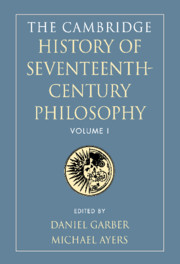Book contents
- Frontmatter
- Introduction
- I The context of seventeenth-century philosophy
- 1 The institutional setting
- 2 The intellectual setting
- 3 European philosophical responses to non-European culture: China
- II Logic, language, and abstract objects
- III God
- IV Body and the physical world
- V Spirit
- Bibliographical appendix
- Bibliography
- References
2 - The intellectual setting
from I - The context of seventeenth-century philosophy
Published online by Cambridge University Press: 28 March 2008
- Frontmatter
- Introduction
- I The context of seventeenth-century philosophy
- 1 The institutional setting
- 2 The intellectual setting
- 3 European philosophical responses to non-European culture: China
- II Logic, language, and abstract objects
- III God
- IV Body and the physical world
- V Spirit
- Bibliographical appendix
- Bibliography
- References
Summary
The seventeenth century saw the emergence of the corpuscularian, or ‘mechanical’, philosophy, which succeeded far beyond any previous science or philosophy in explaining particular phenomena of nature, and which, as a general framework for thought about the physical world, has continued to guide philosophical and scientific investigation down to the present day. Modern scholars have often sought to understand the emergence of this new philosophy by placing it within the context of some previous tradition of thought. In the words of J. H. Randall:
We are confronted by many scholars, each of whom has been exploring some one of these traditions, and each of whom has not unnaturally come to be a vigorous partisan of the basic importance of the particular body of ideas he has investigated. It is well to have each of these intellectual currents carefully explored by men vitally interested in it. For if one thing at least has now grown clear, it is that ‘the emergence of modern science’ was a very complicated affair, and involved a great variety of factors. The central problem, however, is that of the judicious appraisal of the relative importance of a number of ‘necessary conditions’, and for such a wise balancing and weighing we seem hardly ready yet. Each of us may have his own suspicions, but they have certainly not as yet produced agreement.
Two generations later, there is still no agreement. In what follows I will not attempt to assess the relative importance of the different intellectual traditions leading up to the seventeenth century (in any case, the relative importance of these different traditions as background will vary widely, depending on which seventeenth-century figure we wish to study), but I will try to indicate the broad range of intellectual traditions in terms of which the various seventeenth-century figures defined their attempts to establish a new philosophy.
- Type
- Chapter
- Information
- The Cambridge History of Seventeenth-Century Philosophy , pp. 33 - 86Publisher: Cambridge University PressPrint publication year: 2000
References
- 2
- Cited by

